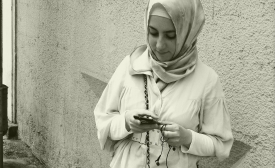social media
In the past week or so, major social media events have included a funeral, a police shooting, and a beheading. I don't mean to suggest that the ceremony for Mike Brown in Ferguson, the shooting of Kajieme Powell a few miles away, or the Islamic State's beheading of James Foley in Syria were primarily social media events. They are all tragedies, which have taken and shattered lives.
As Scotland's September referendum on independence approaches, groups both for and against separation from the United Kingdom are making efforts to appeal to undecided voters. But one particular advertisement has caused a fury of commotion online. Scottish Twitter users had mostly negative initial reactions to the advertisement, which was widely considered condescending and outdated.
The Zara T-shirt called the “Sheriff” went on sale online at 2 a.m., London time, on Wednesday. Within a few hours, it had sparked a social media outcry, with many Twitter posts accusing the clothing company of anti-Semitism — or at least a large measure of insensitivity. The shirt, meant for children, bore a striking resemblance to the top of a Nazi concentration camp uniform.

Philip Seib encourages public diplomats to read the comments section.
Why? Because it’s becoming pretty obvious that Isis’s most effective weapon is the smartphone. The group has been using Twitter, Facebook and YouTube to great effect, to create a digital broth that has both panicked and fascinated us. Their graphic videos make front page news and their deranged tweets sway international diplomacy. Social media strategists round the world must be watching in awe.
With terrorists running rampant in Iraq and Russian convoys violating Ukrainian borders, the U.S. State Department is fussing over a new unnerving threat: its own diplomats taking the “Ice Bucket challenge.” The ice bucket challenge is this summer’s social media fad with a philanthropic twist (donations go to the ALS Foundation, which funds research to fight Lou Gehrig’s disease).
The ruling party has told all 86.6 million of its members to engage with its first foray into social media with a public account launched this month on massively popular mobile social media platform WeChat, which boasts 438 million monthly active users. The account, called “gong chan dang yuan”, or Communist Party member, is managed by the Organisation Department of the party’s highest organ of power, the Central Committee. The department has told all members of the world’s largest political party to follow the account.
Capitalizing on the immense popularity of the ALS ice bucket challenge, an Indian woman has conceived of the rice bucket challenge as a way to encourage charity for the poor. Unlike the ice bucket challenge, which requires the participant to dump a bucket of cold water over their head, the rice bucket challenge asks that participants simply donate a bucket of rice to somebody in need.







